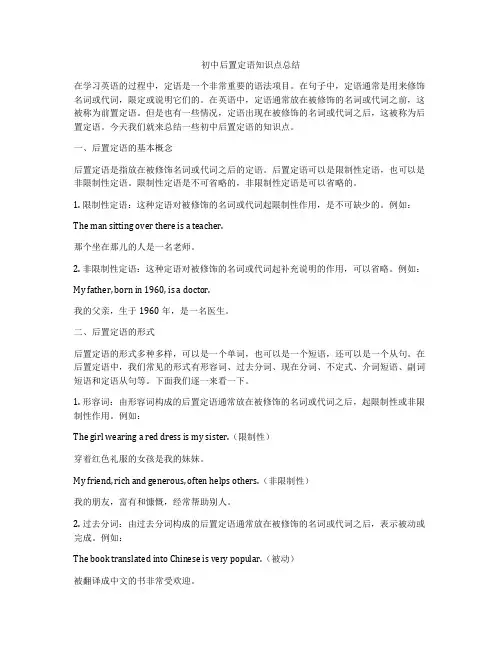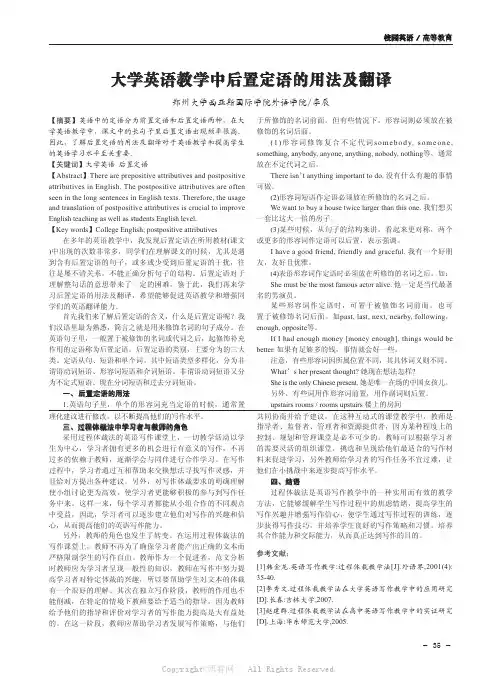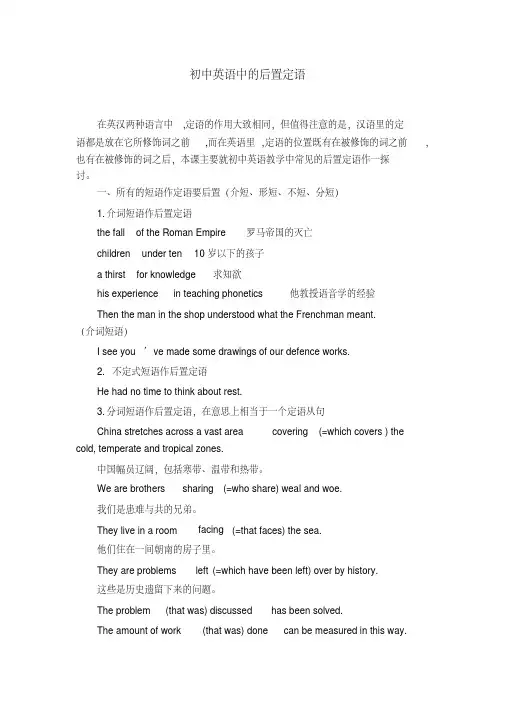(完整版)英语中的后置定语用法详细解答——byFiona
- 格式:doc
- 大小:36.51 KB
- 文档页数:4

定语后置用法英语如果定语放在所修饰的名词或代词后面叫后置定语。
后置定语有三种现象:从句作定语;短语作定语;单个词作定语。
一、定语从句作后置定语定语从句是用句子来修饰主句中的名词、代词及主句本身。
被修饰的名词、代词及主句本身称为先行词。
定语从句则呈现了后置定语的特点。
定语从句有限制性定语从句和非限制性定语从句两种。
例如:He is the manwhom/that I saw yesterday. 他就是我昨天见的那个人。
(whom/that后的从句中作the man的定语)He talked like a native, which/as he hardly was.他说话像个本地人,几乎不像个本地人。
(whigh/as后的从句中作这个句子的定语)二、短语作后置定语备注:非谓语动词作后置定语属于短语作后置定语。
介词短语修饰名词或代词只能作后置定语。
例如:The girl in redthe man with long hair形容词短语作定语必须放在所修饰的名词之后。
例如:I think he is a man suitable for the job. 我认为他是适合做这项工作的人。
现在分词短语做定语时,一定放在被修饰成分的后面,构成后置定语。
现在分词与所修饰的名词和代词为主谓关系。
例如:I don't know the girl standing under a big tree.过去分词作后置定语,过去分词和它修饰的中心词为动宾关系。
例如:I know the girl named Lucy.动词不定式作定语,不定式和它修饰的中心词为主动关系,有“去做。
愿做”之意。
例如:例如:I have a room to live in.三、单个词作后置定语这一部分往往是英语学习中的疑难点,大家在平时的学习中要勤于归纳,多积累,多总结。
enough作定语时,enough为形容词。
既可以放在修饰名词的前,也可以放在名词后。

初中后置定语知识点总结在学习英语的过程中,定语是一个非常重要的语法项目。
在句子中,定语通常是用来修饰名词或代词,限定或说明它们的。
在英语中,定语通常放在被修饰的名词或代词之前,这被称为前置定语。
但是也有一些情况,定语出现在被修饰的名词或代词之后,这被称为后置定语。
今天我们就来总结一些初中后置定语的知识点。
一、后置定语的基本概念后置定语是指放在被修饰名词或代词之后的定语。
后置定语可以是限制性定语,也可以是非限制性定语。
限制性定语是不可省略的,非限制性定语是可以省略的。
1. 限制性定语:这种定语对被修饰的名词或代词起限制性作用,是不可缺少的。
例如:The man sitting over there is a teacher.那个坐在那儿的人是一名老师。
2. 非限制性定语:这种定语对被修饰的名词或代词起补充说明的作用,可以省略。
例如:My father, born in 1960, is a doctor.我的父亲,生于1960年,是一名医生。
二、后置定语的形式后置定语的形式多种多样,可以是一个单词,也可以是一个短语,还可以是一个从句。
在后置定语中,我们常见的形式有形容词、过去分词、现在分词、不定式、介词短语、副词短语和定语从句等。
下面我们逐一来看一下。
1. 形容词:由形容词构成的后置定语通常放在被修饰的名词或代词之后,起限制性或非限制性作用。
例如:The girl wearing a red dress is my sister.(限制性)穿着红色礼服的女孩是我的妹妹。
My friend, rich and generous, often helps others.(非限制性)我的朋友,富有和慷慨,经常帮助别人。
2. 过去分词:由过去分词构成的后置定语通常放在被修饰的名词或代词之后,表示被动或完成。
例如:The book translated into Chinese is very popular.(被动)被翻译成中文的书非常受欢迎。

英语定语后置的详细用法英语定语后置的详细用法后置定语:放在被修饰词后面;用来修饰这个名词或代词的。
后置定语可以分为三大类:1.定语从句;eg.The student who answer the question was John. 2.短语(包括非谓语动词短语:不定式短语现在分词短语过去分词短语);形容词短语,介词短语等;eg.1.介词短语:The weather in Beijing is colder than that in guangzhou. People in the world play basketball.2.形容词短语:He looked at the street full of cars. Italian is a language very difficult to learn.3.现在分词短语:They built a highway leading into the mountains. 4.What’s the lang uage spoken in that area? 5.不定式短语:I have a lot of work to do today. He is always the first to come.3.单个词:包括以a为词首的形容词,如alone,alike,afraid,aware,ashamed,awake等;以后缀-able 和-ible 结尾的形容词;以形容词修饰由any-,some-,every-等跟-body,-one,-thing构成的不定代词。
eg.The girl asleep soundly is my young sister. He is the only person reliable. I’d like something cheaper.4.另外副词也可做后置定语,表时间,地点等。
eg.The weather here is very nice.。

校园英语 / 高等教育大学英语教学中后置定语的用法及翻译郑州大学西亚斯国际学院外语学院/李辰【摘要】英语中的定语分为前置定语和后置定语两种,在大学英语教学中,课文中的长句子里后置定语出现频率很高。
因此,了解后置定语的用法及翻译对于英语教学和提高学生的英语学习水平至关重要。
【关键词】大学英语 后置定语【Abstract】There are prepositive attributives and postpositive attributives in English. The postpositive attributives are often seen in the long sentences in English texts. Therefore, the usage and translation of postpositive attributives is crucial to improve English teaching as well as students English level.【Key words】College English; postpositive attributives 在多年的英语教学中,我发现后置定语在所用教材(课文)中出现的次数非常多,同学们在理解课文的时候,尤其是遇到含有后置定语的句子,或多或少受到后置定语的干扰,往往是屡不清关系,不能正确分析句子的结构。
后置定语对于理解整句话的意思带来了一定的困难,鉴于此,我们再来学习后置定语的用法及翻译,希望能够促进英语教学和增强同学们的英语翻译能力。
首先我们来了解后置定语的含义,什么是后置定语呢?我们汉语里最为熟悉,简言之就是用来修饰名词的句子成分。
在英语句子里,一般置于被修饰的名词或代词之后,起修饰补充作用的定语称为后置定语。
后置定语的类别,主要分为的三大类。
定语从句、短语和单个词。
其中短语类型多样化,分为非谓语动词短语、形容词短语和介词短语。

在英语中某些定语有时放在被修饰词之后,我们称之为“后置定语”、后置定语我们可以分为三种情况: I.单词作后置定语ﻫ1。
当形容词修饰由some、any、every、no等构成得不定代词时通常放在不定代词之后。
ﻫ There is nothing important i nToday’s newspaper、今天得报纸上没有重要得新闻。
ﻫ2、词义具有动词性质得现在分词或过去分词作定语时一般后置、I haveanswered all the letters received.所有收到得信我都已经回了。
ﻫ Wewent through a door openingonto the garden、我们穿过通往花园得大门、3、表示地点或时间得副词here、there、home、downs tairs、upstairs、today、before等作定语时要后置。
The man downstairs came backthis morning、楼下得男子就是今天上午回来得。
On the wayhome, we picked up a lotof rubbish。
在回家得路上我们拣起了很多垃圾。
4。
某些形容词如last、next;enough;nearby以及以-able、—ible结尾得形容词可用在名词之前,也可用在名词之后,其意义基本不变。
ﻫI don’t havemoney enough(enough money)to buy the car. 我没有足够得钱买轿车、ﻫ We went to the movie theatre lastSunday(on Sundaylast)。
我们上星期日去了电影院、ﻫ Hehasn’t found any suitableactors(actors suitable). 她还有找到合适得演员。
5。
某些只能用作表语得形容词如afraid、alive、alone、asleep等作定语时一般后置、ﻫ Hewas t he only manalive、她就是唯一活下来得人、Hespoke like a manafraid. 她讲起话来好像就是胆小之人。

后置定语用法总结,理解英语句子的关键定语用来修饰、限定、说明或补充名词或代词的品质与特征。
定语不仅仅是形容词,名词、介词短语、非谓语动词(动词不定式,现在分词,过去分词动名词)和从句都可以做定语。
定语对我们准确表达起很关键作用。
在英语考试中听力和阅读理解有些题会直接考我们对定语的理解,即答案就是定语。
英语写作要是连非谓语动词做定语,定语从句都没有,一般拿不到高分。
一般说来,定语放在所修饰名词的前面。
单个的形容词、名词、现在分词、过去分词以及动名词作定语,都是放在所修饰词的前面,称为前置定语。
What are the most widely spokenlanguages?最常用的语言有哪些?It's an interestingmovie.这是一部有趣的电影。
但和汉语句型不同的是,很多时候,定语在句子中是放在被修饰词的后面,我们称为后置定语。
在结构复杂的英语句子里,如若判断不出后置定语,往往会影响我们的理解。
下面我来为大家全面简单的总结一下后置定语:01一,单词后置1,形容词英语中部分以a开头的形容词做定语要后置:alive, asleep, alone,awake等I'm the proudest father alive.我是这世上最骄傲的父亲。
Money alonecan't make you happy单靠金钱不能让你快乐。
Sorry, this is the only room available.抱歉,这是唯一可用的房间了为了修辞,句子平衡等需要,其他形容词做后置定语也很常见2,表示时间、地点、方位的副词副词一般做状语,但表示时间、地点、方位的副词有时做定语。
The weather hereis damp and hot in May.五月这里的天气又湿又热。
On the way back, we were caught up in the rain.在回来的路上,我们被雨淋了。

(完整版)英语中的后置定语用法详细解答——byFiona超详细的英语中的后置定语的讲解一定语从句作后置定语——(常出现在句子、文章中,并且是考试的重点,注重理解和应用能力,)1)The girl I saw told me to come back today.2)This house, for which he paid $ 150,000,is now worth $3000,000.这所房子他买时花了15万美元,现在值30万美元。
3)Sunday is a holiday, when people do not go to work.星期天是假日,这一天人们不上班。
学习、理解和掌握英语后置定语,并能够清楚地区分和使用各种后置定语的用法是十分重要的,对学习英语,理解英语文章二短语作定语须后置(一般情况下短语做定语放在被修饰的名词后做后置定语)------(常出现在句子、文章中,注重理解能力,较少出现考题)1.形容词短语做定语,通常后置例如:Italian is a Language very difficult to learn. 意大利语是一门非常难学的语言。
She has a garden much larger than yours . 她的花园比你的花园大得多。
2介词短语作后置定语the bird in the tree树上的那只小鸟the map on the wall墙上的地图the development of China中国的发展the standard of living生活水平the south side of the Changjiang river长江两岸the way to the hotel去旅馆的路the life in the future未来的生活3非谓语动词短语(不定式、现在分词、过去分词)作定语时,必须后置⑴①动词不定式作后置定语:在某些名词后可用动词不定式作定语。



初中英语中的后置定语在英汉两种语言中,定语的作用大致相同,但值得注意的是,汉语里的定语都是放在它所修饰词之前,而在英语里,定语的位置既有在被修饰的词之前,也有在被修饰的词之后,本课主要就初中英语教学中常见的后置定语作一探讨。
一、所有的短语作定语要后置(介短、形短、不短、分短)1.介词短语作后置定语the fall of the Roman Empire罗马帝国的灭亡children under ten 10岁以下的孩子a thirst for knowledge求知欲his experience in teaching phonetics他教授语音学的经验Then the man in the shop understood what the Frenchman meant.(介词短语)I see you’ve made some drawings of our defence works.2. 不定式短语作后置定语He had no time to think about rest.3.分词短语作后置定语,在意思上相当于一个定语从句China stretches across a vast area covering (=which covers ) the cold, temperate and tropical zones.中国幅员辽阔,包括寒带、温带和热带。
We are brothers sharing (=who share) weal and woe.我们是患难与共的兄弟。
They live in a room facing (=that faces) the sea.他们住在一间朝南的房子里。
They are problems left(=which have been left) over by history.这些是历史遗留下来的问题。
The problem (that was) discussed has been solved.The amount of work (that was) done can be measured in this way.The experience (that has been)gained will be of great value to us.There were very few people living here.(现在分词短语)Mr.Smith, the boss of a small factory, once hired a young workercalled John Hill.(过去分词短语)4. 形容词短语作后置定语,相当于一个定语从句He cast it a second time and drew in an old basket full of sand.He saw a magazine on the table next to him.word suitable to the occasion适合这样场合的言辞a village remote from the madding crowd远离喧嚣尘世的村庄sentences difficult to understand难于理解的句子a man ready to lend a hand at any time一个随时乐于帮助他人的人二、所有的定语从句一律自然后置Then there is only one thing I can do.三、甚至许多单个单词也可作后置定语:1.形容词作后置定语①四one、四thing、四body、四where的修饰语(如something, somewhere, anyone, anybody),定语只能后置。

在英语中某些定语有时放在被修饰词之后,我们称之为“后置定语”。
后置定语我们可以分为三种情况:I.单词作后置定语1.当形容词修饰由some、any、every、no等构成的不定代词时通常放在不定代词之后。
There is nothing important in Today’s newspaper. 今天的报纸上没有重要的新闻。
2.词义具有动词性质的现在分词或过去分词作定语时一般后置。
I have answered all the letters received. 所有收到的信我都已经回了。
We went through a door opening on to the garden. 我们穿过通往花园的大门。
3.表示地点或时间的副词here、there、home、downstairs、upstairs、today、before等作定语时要后置。
The man downstairs came back this morning. 楼下的男子是今天上午回来的。
On the way home, we picked up a lot of rubbish. 在回家的路上我们拣起了很多垃圾。
4.某些形容词如last、next;enough;nearby以及以-able、-ible结尾的形容词可用在名词之前,也可用在名词之后,其意义基本不变。
I don’t have money enough(enough money)to buy the car. 我没有足够的钱买轿车。
We went to the movie theatre last Sunday(on Sunday last). 我们上星期日去了电影院。
He hasn’t found any suitable actors(actors suitable). 他还有找到合适的演员。
5.某些只能用作表语的形容词如afraid、alive、alone、asleep等作定语时一般后置。
英语后置定语的用法总结英语后置定语的用法总结如下:1. 形容词作后置定语:单个的形容词作定语,通常放在它所修饰的名词之后。
例如:The climate here is very pleasant.这里的气候十分宜人。
2. 介词短语作后置定语:介词短语作定语时,介词短语的位置也在名词之后。
例如:This is a book of his. 这是他的书。
3. 动词不定式作后置定语:动词不定式作定语的情况不多,多位于被修饰词的后面。
例如:The first textbook to come out in the wake of the new reform is English. 新改革后出版的第一部教科书是英语课本。
4. 副词作后置定语:副词作定语时,一般置于它所修饰的名词之后。
例如:In the world, family is the only place where we can find love, warmth and comfort. 在这个世界上,家是我们唯一能够找到爱、温暖和舒适的地方。
5. 从句作后置定语:从句作定语时,一般置于它所修饰的名词之后。
例如:He found a watch which had belonged to his grandfather in a drawer.他在抽屉里发现了他祖父的一块手表。
6. 名词作后置定语:名词作定语时,通常放在它所修饰的名词之后。
例如:The book of the day is “Alice in Wonderland”. 今天的推荐读物是《爱丽丝漫游奇境记》。
7. 形容词短语作后置定语:形容词短语作定语时,通常放在它所修饰的名词之后。
例如:The little boy, up to his elbows in flour, was baking a cake. 那个小男孩,手肘上沾满了面粉,正在烤蛋糕。
8. 名词短语作后置定语:名词短语作定语时,通常放在它所修饰的名词之后。
后置定语的用法总结后置定语是一种修饰短语、词或句子的语法结构,通常位于被修饰语之后,用来详细描述、限定或补充被修饰语的内容。
这种修饰结构在英语中较为常见,用途广泛,使得表达更加准确、丰富。
一、后置定语的基本结构与位置:后置定语包括介词短语、分词短语、从句、不定式短语等等。
它们可以修饰名词、代词、动词、形容词或其他副词短语。
后置定语通常位于被修饰语之后,用逗号或连字符隔开,以区别于前置定语。
1. 后置定语修饰名词:The man in the black coat is my father.穿着黑色外套的那个人是我父亲。
2. 后置定语修饰代词:The book I borrowed from the library is very interesting.我从图书馆借来的那本书非常有趣。
3. 后置定语修饰动词:He came in followed by his dog.他进来了,后面跟着他的狗。
4. 后置定语修饰形容词:She is happy, surrounded by her friends.她被朋友们包围着,感到很开心。
5. 后置定语修饰副词短语:He ran up the hill, out of breath.他气喘吁吁地跑上了山。
二、后置定语的功能:后置定语可以提供更多的信息,对被修饰语进行补充、说明或限定,丰富了句子的含义和表达的层次。
下面是后置定语常见的功能和作用:1. 补充说明:通过后置定语可以添加额外的描述信息,使句子更加详尽、具体。
The students, excited about the upcoming trip, couldn't wait to board the bus.这些学生对即将到来的旅行感到兴奋,迫不及待地想上车。
2. 限定范围:后置定语可以起到限定作用,缩小被修饰语的范围。
The streets in the city center are always busy.市中心的街道总是很繁忙。
超详细的英语中的后置定语的讲解一定语从句作后置定语一一(常出现在句子、文章中,并且是考试的重点,注重理解和应用能力,)1) The girl I saw told me to come back today.2)T his house, for which he paid $ 150,000,is now worth $3000,000.这所房子他买时花了15 万美兀,现在值30万美兀。
3) Sunday is a holiday, when people do not go to work.星期天是假日,这一天人们不上班。
学习、理解和掌握英语后置定语,并能够清楚地区分和使用各种后置定语的用法是十分重要的,对学习英语,理解英语文章二短语作定语须后置(一般情况下短语做定语放在被修饰的名词后做后置定语)------(常出现在句子、文章中,注重理解能力,较少出现考题)1.形容词短语做定语,通常后置例如:Italian is a Lan guage very difficult to learn. 意大利语是一门非常难学的语言。
She has a garden much larger tha n yours .她的花园比你的花园大得多。
2介词短语作后置定语the bird in the tree树上的那只小鸟the map on the wall墙上的地图the development of China 中国的发展the standard of living 生活水平the south side of the Changjiang river 长江两岸the way to the hotel 去旅馆的路the life in the future 未来的生活3非谓语动词短语(不定式、现在分词、过去分词)作定语时,必须后置⑴①动词不定式作后置定语:在某些名词后可用动词不定式作定语。
例如:ability, anxiety,attempt, decisi on, cha nee, courage, right, determ in ati on, promise, ambiti on, drive, effort, eager ness, failure, in cli nati on, inten ti on, moveme nt, n eed, opport uni ty, pla n, reas on, struggle, time, way, wish 等等。
后置定语知识点总结一、后置定语的基本形式1. 单词后置定语后置定语可以是一个单词,通常放在被修饰词的后面,例如:the man standing there(站在那儿的人)、the book on the table(桌子上的书)等。
2. 短语后置定语后置定语也可以是一个短语,比如一个介词短语或者一个不定式短语,也是放在被修饰词的后面,例如:the girl with long hair(头发长的女孩)、the boy to study with(一起学习的男孩)等。
3. 从句后置定语从句也可以作为后置定语,通常是一个形容词从句或者名词性从句,放在被修饰词的后面,例如:the book that I bought yesterday(我昨天买的书)、the house where I lived when I was young(我小时候住过的房子)等。
二、后置定语的使用规则1. 后置定语的位置后置定语通常放在被修饰词的后面,修饰名词或者代词,对被修饰词进行进一步的描述或说明,起到补充的作用。
例如:the girl with long hair(头发长的女孩)、the book on the table(桌子上的书)。
2. 被修饰词的限定后置定语通常是对被修饰词进行限定或修饰,增加了句子的信息量,丰富了句子的表达内容。
比如:the boy to study with(一起学习的男孩)、the book that I bought yesterday(我昨天买的书)。
3. 疑问词引导有时后置定语会由疑问词引导,如何引导后置定语的从句。
例如:the reason why he left (他离开的原因)、the place where we met(我们见面的地方)。
三、后置定语的常见搭配1. 形容词作后置定语形容词通常作为后置定语,修饰名词或代词,对被修饰词进行补充说明。
例如:the man standing there(站在那儿的人)、the food served on the table(桌子上摆放的食物)。
超详细的英语中的后置定语的讲解一定语从句作后置定语——(常出现在句子、文章中,并且是考试的重点,注重理解和应用能力,)1)The girl I saw told me to come back today.2)This house, for which he paid $ 150,000,is now worth $3000,000.这所房子他买时花了15万美元,现在值30万美元。
3)Sunday is a holiday, when people do not go to work.星期天是假日,这一天人们不上班。
学习、理解和掌握英语后置定语,并能够清楚地区分和使用各种后置定语的用法是十分重要的,对学习英语,理解英语文章二短语作定语须后置(一般情况下短语做定语放在被修饰的名词后做后置定语)------(常出现在句子、文章中,注重理解能力,较少出现考题)1.形容词短语做定语,通常后置例如:Italian is a Language very difficult to learn. 意大利语是一门非常难学的语言。
She has a garden much larger than yours . 她的花园比你的花园大得多。
2介词短语作后置定语the bird in the tree树上的那只小鸟the map on the wall墙上的地图the development of China中国的发展the standard of living生活水平the south side of the Changjiang river长江两岸the way to the hotel去旅馆的路the life in the future未来的生活3非谓语动词短语(不定式、现在分词、过去分词)作定语时,必须后置⑴①动词不定式作后置定语:在某些名词后可用动词不定式作定语。
例如:ability, anxiety, attempt, decision, chance, courage, right, determination, promise, ambition, drive, effort, eagerness, failure, inclination, intention, movement, need, opportunity, plan, reason, struggle, time, way, wish等等。
例句:1)Has he the ability to do the work?他有能力干这项工作吗?2)I don't have the courage to tell you the secret.我没有勇气告诉你那个秘密。
3)You have no right to do such a thing!你没有做这样的事的权利!4)I'll show you my determination to stop smoking.我将向你们表明我戒烟的决心。
②.动词不定式有时可以代替一个定语从句和后置定语。
例如:(1)Perhaps in the years to come(=that will come)we will meet again.也许在未来的岁月中我们还会再见面。
(2)In the lectures to follow(=that will follow), she talked of her trip to America.在后来的讲座中,她谈到了她的美国之行。
(3)She made a list of things to be taken(= which/that will be taken)on the way.她开了一张要带在路上用的物品清单。
③另外,动词不定式还可以和关系代词which连用作定语:1)She must have time in which to pack.她必须有时间收拾行李。
2)He also had a revolver with which to defend himself.他还有一把防身用的左轮手枪。
3)He only had long night in which to study.他只有漫漫长夜可以用来学习。
⑵现在分词短语作后置定语。
例如:1)There is a lady asking to see you.有位女士要求见你。
2)The girl sitting by my side is my cousin.坐在我旁边的是我表妹。
3)Here is a map showing you how to get to the railway station.这儿有一张地图,告诉你怎样去火车站。
⑶.过去分词短语作后置定语。
例如:1)What did you think of the play put on by the students?你认为学生们上演的话剧怎么样?2)She is a nurse trained by ourselves.她是我们自己培养的护士。
3)What is the language spoken in svain?西班牙使用的是什么语言?⑷.部分过去分词也可以作后置定语。
例如:left, gained, used, offered, discussed, ordered, wounded, injured, concerned, conducted, done, held, arranged, planned, suggested, finished, completed, arrested, given, fallen, constructed, missed,等等。
例如:1)Is there anybody injured?有人负伤吗?2)The money left is not enough for so many people to live through.剩余的钱不够这么多人用的。
3)She liked all the courses offered.她对所开的课程都很喜欢。
4)The experience gained will be of great value to us.取得的经验将我们很有价值。
三单个词作后置定语的情况:(一般情况下单个词做定语一般放在被修饰的名词前做前置定语,以下情况放在被修饰的名词后做后置定语)——(常出现在句子、文章中,注重理解能力,中学较少出现考题,大学考试会出现考题)1、形容词作疑问词的后置定语修饰疑问词what, which, who, whose, whom, when, where, why, how时,修饰语要后置。
例如:1)What important would you like to talk about?你将谈论什么重量的事情?2)Who else will go with us?还有谁将和我们一起去?3)Where new have they decided to visit?他们决定到哪些没有去过的地方参观?2形容词作复合不定代词的后置定语当被修饰词为复合不定代词something, anything, nothing, everything; somebody, anybody, nobody, everybody; someone, anyone, everyone, no one时,修饰语常位于被修饰的不定代词之后。
例如:1)I have something important to tell you.我有些重要的事情要告诉你。
2)Do you have anything else to say about it?关于这件事,你还有什么要说的吗?3)Someone important will give the students a lecture on the current international situation this afternoon.今天下午,一位重要的人物将给学生们做一场有关当前国际形势的报告。
3.enough作后置定语enough(a.)修饰名词时既可以在名词前,也可以在名词后。
例如:1)We have not enough time(or time enough)to do the job.我们没有足够的时间做该工作。
2)They have enough people(or people enough)to do the experiment.他们有足够多的人手做这个实验。
但enoush(adv.作副词)修饰形容词或副词时,须位于被修饰的形容词或副词之后。
例如:good enough (足够好的),large enough(够大的),fast enough(够快),well enough(相当好)。
4.部分副词作后置定语某些表示地点、方位、时间的副词作定语时,通常要后置如:above(上方的),below(下面的),on(活动,进行,上演),out(外出),back(后面的),away(离开的)等修饰名词时位于被修饰词之后。
例如:Do you know the lady downstairs ? 你认识楼下的那位女士吗?The people there are going to Beijing. 那里的人们打算去北京。
The life tomorrow will be more comfortable. 明天的生活将令人感到更舒适。
The clouds above began to get thicker,上方的云开始密集起来。
From the hill top we could see the plain below.从山顶上我们可以看到下面的平原。
She went to see them on the evening out.凡她晚上外出总去看他们。
5.含有-able , -ible 等后缀的形容词作定语时,常放在被修饰的词后面。
例如:The travellers have tried all the ways possible.这些旅行者已试过了所有可能通的路。
I have a computer available.我有一台可使用的电脑。
6.某些以a开头的形容词(一般做表语)如alive 、asleep等作定语时,必须后置。
例如:The lady is one of the greatest novelist alive.这位女士是当今最伟大的小说家之一。
The man asleep in bed is my elder brother .熟睡在床上的人是我哥哥。